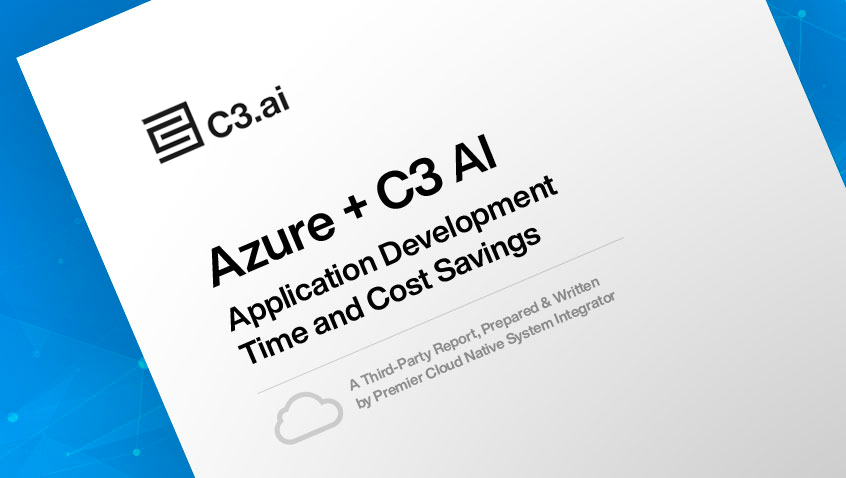- AI Software
- C3 AI Applications
- C3 AI Applications Overview
- C3 AI Anti-Money Laundering
- C3 AI Cash Management
- C3 AI Contested Logistics
- C3 AI CRM
- C3 AI Decision Advantage
- C3 AI Demand Forecasting
- C3 AI Energy Management
- C3 AI ESG
- C3 AI Health
- C3 AI Intelligence Analysis
- C3 AI Inventory Optimization
- C3 AI Process Optimization
- C3 AI Production Schedule Optimization
- C3 AI Property Appraisal
- C3 AI Readiness
- C3 AI Reliability
- C3 AI Smart Lending
- C3 AI Supply Network Risk – bak
- C3 AI Turnaround Optimization
- C3 Generative AI Constituent Services
- C3 Law Enforcement
- C3 Agentic AI Platform
- C3 Generative AI
- Get Started with a C3 AI Pilot
- Industries
- Customers
- Events
- Resources
- Generative AI for Business
- Generative AI for Business
- C3 Generative AI: How Is It Unique?
- Reimagining the Enterprise with AI
- What To Consider When Using Generative AI
- Why Generative AI Is ‘Like the Internet Circa 1996’
- Can the Generative AI Hallucination Problem be Overcome?
- Transforming Healthcare Operations with Generative AI
- Data Avalanche to Strategic Advantage: Generative AI in Supply Chains
- Supply Chains for a Dangerous World: ‘Flexible, Resilient, Powered by AI’
- LLMs Pose Major Security Risks, Serving As ‘Attack Vectors’
- What Is Enterprise AI?
- Machine Learning
- Introduction
- What is Machine Learning?
- Tuning a Machine Learning Model
- Evaluating Model Performance
- Runtimes and Compute Requirements
- Selecting the Right AI/ML Problems
- Best Practices in Prototyping
- Best Practices in Ongoing Operations
- Building a Strong Team
- About the Author
- References
- Download eBook
- All Resources
- Publications
- Customer Viewpoints
- Blog
- Glossary
- Developer Portal
- Generative AI for Business
- News
- Company
- Contact Us
Glossary
- Artificial Intelligence
- AI Agents
- AI in Finance
- AI in Manufacturing
- Anomaly Detection
- Anti-Money Laundering
- Asset Performance Management
- Asset Reliability
- Demand Forecasting
- Digital Disruption
- Digital Transformation
- Digital Twin
- Elastic Cloud Computing
- Energy Management
- Enterprise AI
- Enterprise AI Platform
- Ethical AI
- Inventory Planning
- IoT Platform
- Know Your Customer (KYC)
- Machine Vision (Computer Vision)
- Model-Driven Architecture
- Multi-Cloud
- No Code
- Predictive Analytics
- Predictive Maintenance
- Process Optimization
- Production Scheduling
- Stochastic Optimization
- Supply Chain Management
- Type System
- Data Unification & Management
- Machine Learning (A to L)
- Artificial General Intelligence
- Bias
- Canonical Schema
- Canonical Transform
- Classification
- Classifier
- Classifier Performance
- Clustering
- Coefficient of Discrimination, R-Squared (R2)
- Convolutional Neural Network (CNN)
- Correlation
- Data Cleansing
- Data Labels
- Data Lineage
- Deep Learning
- Dimensionality Reduction
- Explainable AI
- F1 Score
- False Positive Rate
- Feature Engineering
- Feedback Loop
- Field Validation
- Gaussian Mixture Model (GMM)
- Generalized Linear Models
- Gradient-Boosted Decision Trees (GBDT)
- Features
- Ground Truth
- Holdout Data
- Hyperparameters
- Information Leakage
- LIME: Local Interpretable Model-Agnostic Explanations
- Linear Regression
- Loss Function
- Low-Dimensional Representation
- Machine Learning (M to Z)
- Mean Absolute Error
- Mean Absolute Percent Error
- Machine Learning Pipeline
- Model Drift
- Model Prototyping
- Model Training
- Model Validation
- Normalization
- Overfitting
- Precision
- Problem Tractability
- Random Forest
- Recall
- Receiver Operating Characteristic (ROC) Curve
- Regression Performance
- Regularization
- Reinforcement Learning
- Reporting Bias
- Ridge Regression
- Root Mean Square Error (RMSE)
- Selection Bias
- Shapley Values
- Supervised Machine Learning
- Tree-Based Models
- Underfitting
- Unsupervised Machine Learning
- XGBoost
Production Scheduling
What is production scheduling?
Production scheduling is the process of planning and scheduling the manufacturing activities within a production facility. It involves determining which products to produce, when to produce them, and in what quantities. The goal of production scheduling is to optimize the use of resources, minimize production costs, and ensure production delivery on time and in full to meet customer demand. Effective production scheduling helps businesses maximize efficiency, reduce lead times, and improve overall productivity.
What is production scheduling software?
Production scheduling software is a tool that helps manufacturers plan and manage production processes more effectively. By leveraging advanced algorithms and data analytics, production scheduling software can generate optimized production schedules that account for various constraints such as resource availability, production capacity, and customer demand.
The software enables manufacturers to streamline their operations, reduce downtime, and improve the accuracy of their production plans. With real-time data integration and automated scheduling capabilities, production scheduling software enhances decision-making and supports more agile and responsive manufacturing processes.
Why is production scheduling software important?
Manufacturing is a complex and multi-dimensional task that involves coordinating various resources, processes, and constraints. Traditional planning systems, which rely on fixed rules and deterministic methods, struggle to adapt to the constantly changing market conditions and often overlook critical operational constraints. These systems are challenging to maintain due to evolving processes and often require manual interventions, leading to inefficient schedules, costly changeovers, and underutilized production lines.
- Optimized Resource Utilization and Cost Savings: Production scheduling software ensures efficient use of resources, maximizing productivity, leading to significant cost savings.
- On-Time Delivery and Improved Customer Satisfaction: Production scheduling software enables on-time delivery and increases customer satisfaction by providing accurate production plans.
- Risk Reduction and Increased Operational Efficiency: Reliable production schedules reduce the risk of delays, stockouts, and excess inventory to enhance overall operational efficiency.
- Quick Response to Changes: The software enables manufacturers to quickly respond to changes in demand, supply chain disruptions, and other unforeseen events, maintaining consistent operations.
What is AI-driven production scheduling?
AI-driven production scheduling is the practice of using artificial intelligence (AI) and machine learning (ML) to optimize manufacturing and supply chain operations by dynamically adjusting production schedules based on real-time data. Traditional scheduling approaches often rely on static rules and historical trends, making them inflexible to sudden disruptions such as equipment failures, supplier delays, or demand fluctuations. Organizations can integrate AI-driven insights to create adaptive schedules that automatically adjust to evolving conditions, minimizing downtime and maximizing resource utilization.
AI-driven production scheduling enables operational resilience by continuously monitoring internal and external factors that influence production performance. It evaluates constraints such as raw materials availability, production lead times, maintenance schedules, and supply chain risks, ensuring that manufacturing processes remain aligned with shifting business goals.
By implementing AI-driven production scheduling software, organizations can:
- Dynamically adjust production schedules in real-time based on evolving customer demand, supplier delays, and market conditions.
- Improve response times to unexpected production constraints such as workforce, availability, and equipment downtime with flexible scenario analysis.
- Reduce dependency on manual forecasting by using advanced optimization techniques to generate production schedules.
- Enhance visibility across supply chain operations by integrating AI-powered insights on top of existing MRP and ERP systems.
How does C3 AI enable AI-driven production scheduling?
C3 AI Production Schedule Optimization helps production schedulers improve fill rates, line utilization, and profitability with dynamic production schedules. The application enhances production scheduling using AI by unifying disparate data and applying best-in-class optimization techniques that account for thousands of constraints across capacity, materials, labor, and more.
- Comprehensive Data Integration and Holistic Scheduling: By integrating data from various sources, including customer demand, supply chain operations, and manufacturing constraints, the application provides a comprehensive view of the entire production process, generating optimal schedules that consider multiple factors.
- Enhanced Fill Rates and Profitability: The application improves fill rates, line utilization, and profitability through AI-driven scheduling, ensuring maximum utilization of facilities and shifts, and increasing order fulfillment and scheduling efficiency.
- Efficient Disruption Management: C3 AI Production Schedule Optimization enables organizations to respond to unexpected disruptions efficiently and reduce last-minute scheduling changes to maintain smooth operations.
- On-Time, In-Full Delivery: By optimizing the entire production and distribution process, the application ensures on-time, in-full (OTIF) delivery to meet customer demand.
- Flexible Optimization Strategies: The platform offers flexible optimization strategies for both short-term, execution-focused scheduling and long-term supply and capacity planning, adapting to changing conditions.
- AI-Powered Evidence Package: To enable user trust and adoption, C3 AI Production Schedule Optimization supports each AI schedule with an evidence package that includes feature contributions, contextual data, and detailed reasoning.
Examples of customers who have successfully used C3 AI Production Schedule Optimization to improve production scheduling include:
- Agribusiness: A global agribusiness food manufacturer deployed C3 AI Production Schedule Optimization and C3 AI Demand Forecasting applications to improve demand forecast accuracy and reduce the time required to generate production schedules.
- Hydrocarbon Processing Company: A large hydrocarbon processing company deployed C3 AI Production Schedule Optimization to minimize manufacturing costs and improve customer demand forecasting accuracy.
- Steel Manufacturer: A national steel manufacturer deployed C3 AI Production Schedule Optimization to maximize net production and reduce time to plan.
C3 AI applications are built on the C3 Agentic AI Platform, an end-to-end platform for developing enterprise AI applications. The C3 Agentic AI Platform offers a scalable and secure approach to enterprise AI, providing the necessary tools and capabilities to quickly design, develop, and operate advanced, industrial-scale AI applications.
The unique model-driven architecture of the C3 Agentic AI Platform allows organizations to build AI applications with less code, time, and effort compared to other methods. The platform features an end-to-end architecture that supports agentic AI services and capabilities such as generative AI integration and omni-modal data fusion, integrates with existing enterprise software systems, ingests into domain object models, applies out-of-the-box and configurable AI algorithms, and enables end-user interaction through intuitive, simple user interface applications.
C3 AI also provides a proven methodology and best practices for customer developers to configure, extend, and develop proprietary AI applications. C3 AI shares this methodology in a center of excellence collaboration model, delivering proven results as demonstrated by a decade of experience working with some of the world’s largest organizations on industrial scale use cases.



